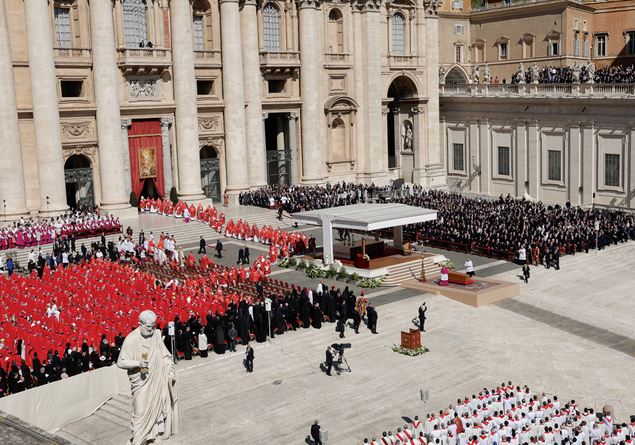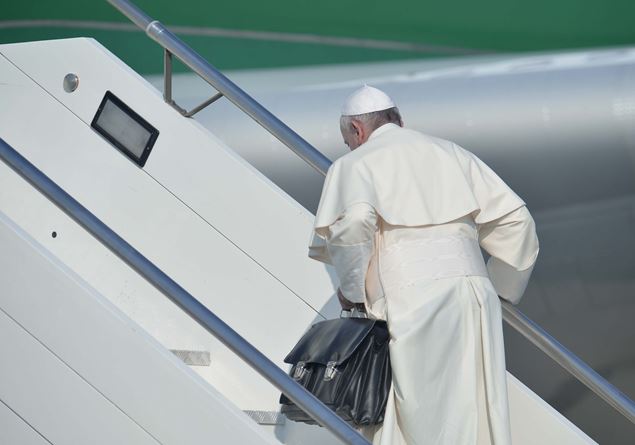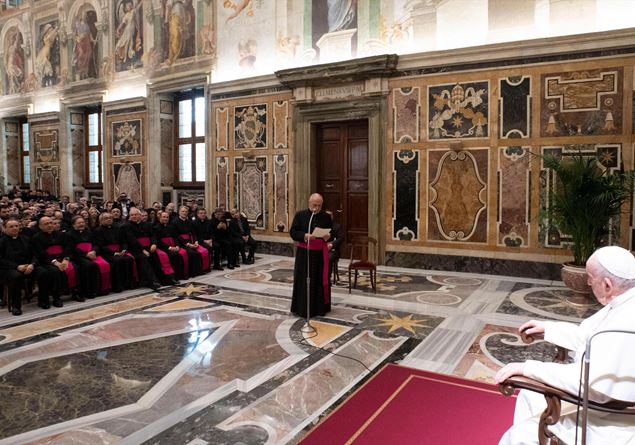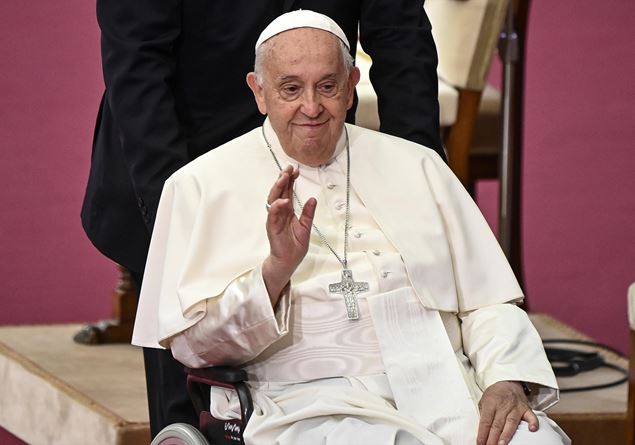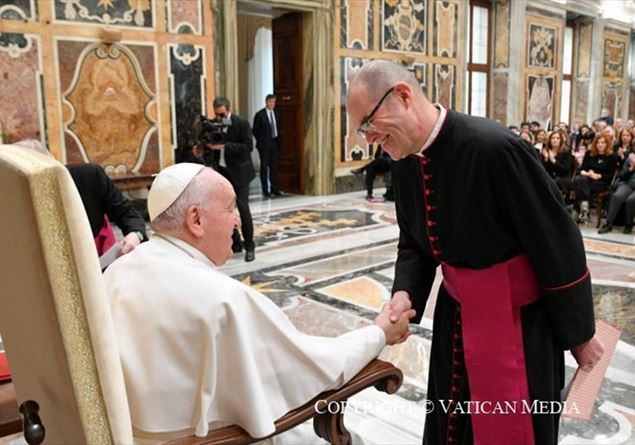We publish the full discourse of Pope Francis At the inauguration of the judicial year of the Court of the Rota Romana which took place in the Clementina room, in the Vatican.
Dear prelates liars! The inauguration of the judicial year of the Court of Rota Romana offers me the opportunity to renew the expression of my appreciation and my gratitude for your work.
I cordially greet Msgr. Decano and all of you who provided your service in this court.
This year the tenth anniversary of the two motu proprio has occurred Mitis iudex dominus iesus And MISTE et Misericors Iesus, with which I reformed the trial for the nullity declaration of marriage. It seems to me appropriate to take this traditional opportunity to meet with you to recall the spirit that has permeated this reform, by you applied with competence and diligence in favor of all the faithful.
The need to modify the rules relating to the nullity process had been manifested by the synod fathers gathered in the 2014 extraordinary assembly, formulating the request to make the processes more accessible and agile (cf Relatio Synodi 2014, 48).
The Synod Fathers thus expressed the imbalance of completing the pastoral conversion of the structures, already desired in the apostolic exhortation Evangelii Gaudium (cf. n. 27).
It was more appropriate that that conversion also touched the administration of justice, so that it would respond in the best way to those who turn to the Church to shed light on their marital situation (see speech at the Court of the Rota Romana, 23 January 2015). I wanted the diocesan bishop to the center of the reform.
In fact, he is responsible for administering justice in the diocese, both as guarantor of the proximity of the courts and supervision of them, and as a judge who must decide Personal in cases where the nullity is manifest, that is, through the Processus Brevior as an expression of the concern for the Salus Animarum.
Therefore I urged the inclusion of the activity of the courts in diocesan pastoral care, assigning the bishops to ensure that The faithful are aware of the existence of the process as a possible remedy for the situation of need in which they find themselves. Thread sometimes come and know that the faithful ignore the existence of this street.
Furthermore, it is important “that the gratuity of the procedures is ensured, so that the Church (…) shows the free love of Christ from which we have all been saved” (Proemio, VI). In particular, the bishop’s concern is implemented in guaranteeing by law the Constitution in his own diocese of the court, with people – clerics and lay people – well formed, suitable for this function; and ensuring that they do their work with justice and diligence.
The investment in the formation of these operators – scientific, human and spiritual training – always goes for the benefit of the faithful, who are entitled to careful consideration of their instances, even when they receive negative feedback. He guided the reform – and must guide his application – the concern of the salvation of souls (Cfr Mitis Iudex, Proemio).
They question us The pain and hope of many faithful who seek clarity regarding the truth of their personal condition and, consequently, regarding the possibility of full participation in sacramental life. For many who have “lived an unhappy marriage experience, the verification of the validity or not of marriage represents an important possibility; And these people must be helped to travel as easily this path as easily “(speech to the participants in the course promoted by Rota Romana, 12 March 2016).
The rules that establish the procedures must guarantee some fundamental rights and principles, mainly the right of defense and the presumption of validity of the marriage. The purpose of the process is not that “to unnecessarily complicate the life of the faithful nor much less of exacerbating its quarrels, but only to make a service to the truth “ (Benedict XVI, speech at the Rota Romana, January 28, 2006).
It comes to mind what he said St. Paul VI, After completing the reform made with Motu proprio Causas double. He observed “as in the simplifications (…) introduced in the discussion of the marriage causes, we want to make this exercise easier, and therefore more pastoral, without this having to prejudice the criteria of truth and justice, to which a process must honestly stick to , in the trust that the responsibility and wisdom of the shepherds are religiously and more directly committed “(speech to the Roman Rota, January 30, 1975).
Also the recent reform He wanted to encourage “not the nullity of marriages, but the speed of the processes, no less than just simplicity, so that, because of the delayed definition of the judgment, The heart of the faithful who await the clarification of their state is not oppressed by the darkness of doubt for a long time “(Mis Iudex, Proemio).
In fact, to avoid that, due to too complex procedures, the saying “Summum ius Summa Iniuria” (Cicero, de officiis I, 10.33), will occur, I suppressed the need for the double compliant sentence and encouraged to decide faster the causes in which the nullity is manifest, aiming to the good of the faithful and wishing to bring peace to their consciences.
It is evident – but I want to reiterate it here – that The reform strongly interprets your prudence in applying the rules. And this “requires two great virtues: prudence and justice, which must be informed by charity. There is an intimate connection between prudence and justice, since the exercise of Prudentia iuris aims to knowledge of what is right in the concrete case “(speech to the Roman Rota, 25 January 2024).
Each protagonist of the process approaches the conjugal and familiar reality with veneration, because the family is a living reflection of the communion of love which is God Trinity (cf. Amoris Laetitia, 11).
In addition, the spouses united in the wedding received The gift of indissolubility, which is not a destination to be achieved with their effort, nor a limit to their freedom, but a promise of God, whose loyalty makes that of human beings possible.
Your job of discernment on the existence or not of a valid marriage is a service to Salus Animarumas it allows the faithful to know and accept the truth of their personal reality. In fact, “every right sentence of validity or nullity of marriage is an contribution to the culture of indissolubility both in the Church and in the world” (S. John Paul II, speech to the Roman Rota, 29 January 2002).
Dear brothers, the Church entrusts you with a task of great responsibility, but before even of great beauty: help purify and restore interpersonal relationships. The jubilee context in which we find ourselves fill your work of hope, of the hope that does not disappoint (cf. RM 5.5).
I invoke on all of you, peregrantes in Spem, the grace of a joyful conversion and the light to accompany the faithful to Christ, who is the mild and merciful judge.
I bless you, and I ask you please pray for me. Thank you!
